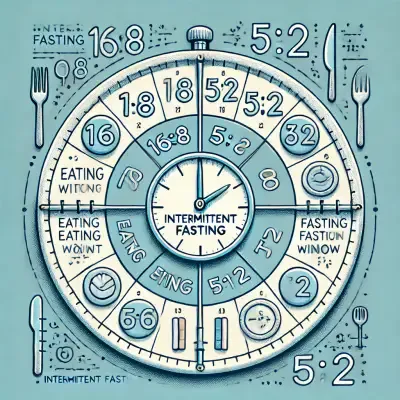Intermittent fasting (IF) has gained popularity among individuals seeking effective weight loss and health management strategies. Notably, it has shown remarkable potential in reducing fatty liver compared to traditional calorie-restricted diets. Studies from Chung-Ang University Hospital (2023) and the University of Sydney (2022) highlight its superior benefits in addressing fatty liver conditions.
The Link Between Intermittent Fasting and Fatty Liver Reduction
Understanding Intermittent Fasting
Intermittent fasting involves scheduled periods of fasting and eating. Popular approaches include the 16:8 method, where individuals fast for 16 hours and eat during an 8-hour window, and the 5:2 method, which entails eating normally for five days and restricting calorie intake for two days a week. These structured patterns can help regulate metabolism and reduce fat accumulation in the body, including the liver.
Key Study Findings: Superior Results for Fatty Liver
A 12-week study conducted by Chung-Ang University Hospital compared the effects of intermittent fasting with daily calorie-restricted diets.
- Participants: 63 non-diabetic individuals
- Methods:
- Intermittent Fasting Group: Consumed 2,000–2,500 kcal on five days and 500–600 kcal on two fasting days per week.
- Calorie Restriction Group: Consumed a steady daily intake of 1,200–1,800 kcal.
- Results:
- Fatty liver reduction rate for the intermittent fasting group: 72.2%.
- Fatty liver reduction rate for the calorie restriction group: 44.4%.
Additionally, in the obese subgroup, intermittent fasting resulted in a more significant decrease in both fatty liver levels and body weight than calorie restriction.
How Does Intermittent Fasting Work?
Boosting Metabolism and Fat Breakdown
Intermittent fasting enhances the activation of metabolic genes and improves insulin sensitivity, preventing excessive fat storage. According to research by Harvard Medical School, intermittent fasting stimulates autophagy, a cellular process that breaks down damaged cells and converts stored fat into energy, aiding in reducing fatty liver.
Reducing Inflammation and Improving Liver Function
Studies by the National Institutes of Health (NIH) reveal that intermittent fasting decreases inflammation markers and stabilizes liver enzyme levels, such as ALT (Alanine Transaminase), a key indicator of liver health.
Global Research on Intermittent Fasting’s Benefits
University of Sydney Findings
The University of Sydney reported that intermittent fasting is more effective than traditional low-calorie diets in reducing fatty liver. Given that fatty liver can lead to severe complications such as cirrhosis or liver cancer, this finding underscores its importance as a preventive health strategy.
Improvements Across Health Metrics
- New England Journal of Medicine (2021): Highlighted that intermittent fasting enhances brain neuroplasticity and offers neuroprotective benefits.
- The Lancet (2022): Demonstrated improvements in metabolic syndrome and stabilized blood sugar levels in type 2 diabetes patients.
Systematic reviews in Obesity Reviews also confirm that intermittent fasting positively impacts cardiovascular health and body fat reduction.
Important Considerations Before Starting Intermittent Fasting
While intermittent fasting is effective for fatty liver reduction and weight loss, its implementation must be tailored to individual health conditions. People with chronic illnesses should consult a healthcare professional to design an appropriate fasting schedule and avoid potential risks.
Conclusion: The Potential of Intermittent Fasting
Intermittent fasting stands out as a proven strategy for reducing fatty liver and achieving weight loss. Beyond weight management, it contributes to overall metabolic health and quality of life improvements. As research continues, its applications are expected to expand further, providing hope for those seeking sustainable and impactful health solutions.
Recommended Articles to Read Together

